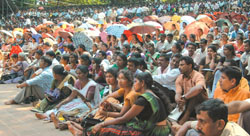|
DAILY NEWS ONLINE |
|
|
|
OTHER EDITIONS |
|
|
|
|
|
|
|
|
|
OTHER LINKS |
|
|
|
|
|
|
  |
The role of civil society
|
|
|
To those that think of a 'no way out' of the present quagmire, the book indeed is a rare prescription as it elucidates the way to good governance and the extinction of whatever bad regime through the civil society mechanism.
Retrospective thinking reminds readers of the numerous dictators banished from their homelands - an outcome of a strong and vibrant civil society.
If justice, equity and fairplay was justification of system replacement the reader sees the non-realisation of these ideals so effectively portrayed by the different sociologists. Cultural homogenisation ended up an unsuccessful target as the nation state of post colonial times repressed diversity and removed the collective plurality and togetherness in built in pre-modern states.
The authors successfully drive home how religions and caste-based communities of traditional societies, heterogenous as they were yet harmonic, which characteristics were not to be in nation states.
The reader also learns how the citizenry of such states grapple with the problem of a commensuration between the irregularities, fundamentalism and greater human oppression on the one hand and the great drama and celebration of the market and civil society.
The disastrous socio/cultural constructs invigorated by what came to be known as national pride in nation state environs, the diverse institutional mechanism manipulated for such display, the role of the cultural capital in creating nationalities invites interestingly indignant reading.
The book's contents is also a stunning inference of how identity politics in caste setting, followed such amid class and truly enough is replaced now by ethnicity.
As the drama unfolds we also see the state's supremacy over the people (though in the world of make believe to the contrary) a colossal giant fostering repression and injustice while its citizenry one author describes (the wretched of the earth) negotiates with a rapacious and impervious market.
The varied institutional transformations operative against the backdrop of a 'cracking state' and the detailed reasons for the sudden and effective emergence of these NGOs makes interesting reading. From forest management to drinking water to women's thrift societies the 'dramatic shift' to NGOs is on.
As to why these institutions have not come under a close scrutiny in as much as others is worth finding out as the reader begins to notice the overlap between academic justification and NGOs lucrative financial rewards giving readers a clue of why developmental ventures need academic licensing. In the face of one institutional failure the quick follow up of another (State and NGO) ever so persistent, one begins to understand how the system is kept going to prevent breakdown.
The book also points out how as never before the importance given to civil society.
But one begins to wonder how things could finally culminate in positive aura as is inferred from the contents in author's presentations as leanings towards pecuniary benefit will far outweigh what is to be achieved as public good. Intellectual capital itself is weaned away from these cherished ideals.
What little remained in the intellectual arena regretfully is being lapped up by NGOs and the intensity of pecuniary importance invariably lead intellectual capital to forfeit all that comes as morality. Intellectual licensing of what falls short of morality is witnessed as many members of the academic community green light numerous projects and ventures in what appears to be for public good.
The State - an outcome of reason to be checked by civil society providing a community's moral and intellectual leadership is neatly outlined on the role of civil society.
How civil society could remove State hegemony when the force of such society itself 'hegemonious' as it were, helps a country's citizenry escape the clutches of such State hegemony is all rather interesting reading at which point what could bring to readers' mind is the non-accessibility of such knowledge among grass roots.
Whither then its workability.
However, gross pessimism need not be to confront State repression and high rates of politicisation - assured by the book's message being 'its all in people's hands'.
|
|

